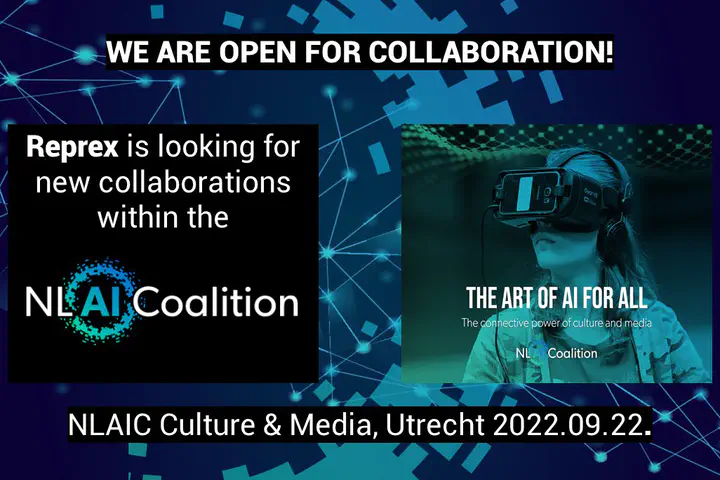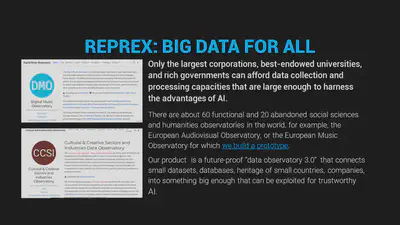Dutch AI Coalition Working Group Culture and Media
Cultural AI Lab & Community Day of NLAIC Working Group Culture and Media
 Reprex is looking for new collaborations within the NLAIC
Reprex is looking for new collaborations within the NLAICReprex presented its Digital Music Observatory and Cultural Creative Sectors Industries Data Observatory as platforms for developing and evaluating trustworthy AI in the cultural domains. We hope to find new partners within the NLAIC community to join our open, collaborative projects.

It was particularly important for us to get away from the Hague, and meet organizations like DEN and the KB to find out how our ambitious plans could connect to their excellent work. Reprex is a finalist in the Hague Innovators Challenge 2022, and we would like to bring at least one global observatory, the planned European Music Observatory, into our beautiful and smart city. While knowledge graphs are virtual and live in the web 3.0, the Dutch AI Coalition and the country’s future competitiveness need to ensure that essential knowledge graphs will be managed by the ecosystem of Netherlands-based researchers, institutions, and startups. The ethical consciousness shown by the members of our Culture AI Lab shows that it is probably the best for future human generations globally, too.
 prototype.](/media/img/blogposts_2022/NLAIC_SABIO_20220922_hu2e6a9bd7181d81986d1e8663c909f3b5_95805_0cd5033168ffe7c5635836ef3913bbef.webp)
The Culture AI Lab presented a handful of very interesting, ethical and interesting projects. Pressing Matter responds to growing concerns in the Netherlands and Europe about how to deal with the legacies of colonialism in museums and builds innovative tools for museums (and broader society) to address the question of ownership of objects collected in the colonial period. Dr Emily Hansell Clark, former editor of our Data&Lyrics blog, presented the Polyvocal Interpretation of Contested Colonial Heritage project.
Both projects are conceptually and technologically relevant to our Listen Local project. Our project aims to prevent the colonization or start the de-colonization of the local music ecosystem and make local artists of Utrecht, Vilnius, or Sarajevo visible and audible in their own cities’ public spaces or on the smartphones of their town.
The most compelling use case of Listen Local project is finding out why music recommender systems do not recommend some music at all. Or why is it so hard to connect Utrecht-based artists with fans living or visiting Utrecht on the Spotify or YouTube platform? The Responsible Recommenders in the Public Library Sector is looking for similar answers for librarians to avoid all recommendations to visitors pointing to U.S. authors and publishers.
.](/media/img/blogposts_2022/NLAIC_library_recommendations_20220922_hu64405b9e0d5fc8fdf474c3de17f6e447_1083889_3afd57716a8a927861fcbf9e249223d6.webp)
Our deep dive into legislative and regulatory issues of AI highlighted that the past decade unleashed global web-based tools that have the potential to undermine our democratic and cultural cohesion. Reassuringly, we have seen that our thinking about the dangers of AI on European culture and the technological solutions to combat them are very widely shared by NLAIC Culture and Media members. We hope that our partners’ policy work in the Digital Music Observatory and our forming new observatories will support policy design and decision-making that will protect the Netherlands and the EU from some of these threats.
Learn more about the Dutch AI Coalition’s Cultur and Media Working Group (in Dutch:)